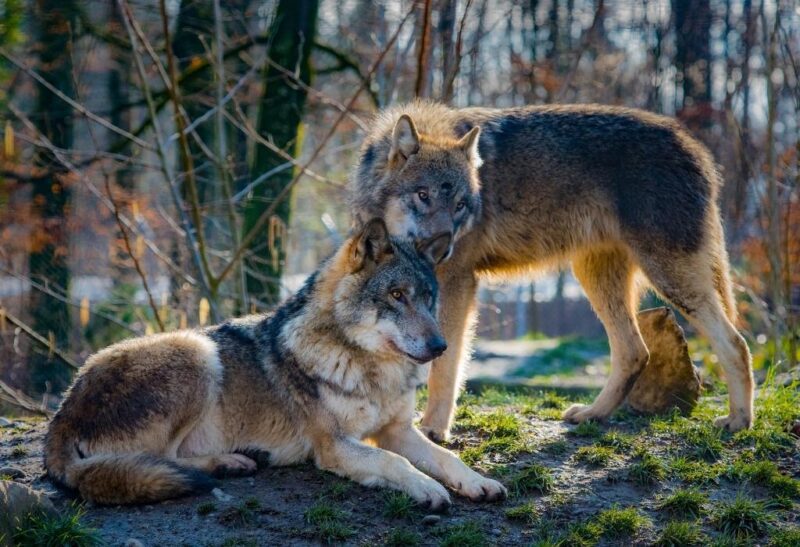When it comes to the role of wolves in creating balanced ecosystems, they’re notorious for being apex predators. As such, they’re at the very top of the food chain, often preying on smaller and weaker mammals. Because of this, wolves developed a reputation for being carnivorous.
Wolves are classified as true carnivores, but they also resort to eating vegetation when there’s not enough food. Interestingly, when there is no vertebrate prey around, wolves resort to eating insects before they decide to eat plants. Even when they eat plants, it will be merely supplementary.
Wolves cannot be classified as omnivores or herbivores. These predatory mammals require high amounts of protein for their survival, and plant-based protein will not be enough to cover their needs. This is why a wolf’s diet is quite intriguing.
Table of Contents
Why Are Wolves Carnivores?
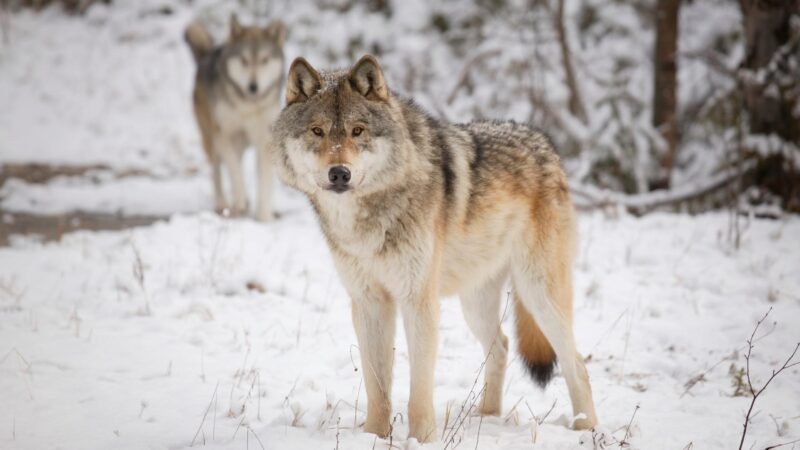
There are several reasons why wolves are carnivores. One of which lies in their body’s need for protein. No other food source contains higher protein content than meat.
They need protein because they need a lot of energy for their day-to-day activities. Compared to carbohydrates, protein is considered a long-term energy source. Thanks to this long-lasting energy, wolves become capable of attacking their prey – which often includes quite a chase.
Additionally, since protein breaks down longer than carbohydrates, it allows them to have a lot of stored energy. Unlike other animals, wolves eat only when they make a successful hunt. That means that it might take them a few days to have another meal. Thanks to their stored energy, they can go about their lives for days, without eating.
Another reason why wolves are carnivores lies in their position in the ecosystem. They’re fearless hunters who prey on animals at the lower levels of the food chain. As apex predators, they control the prey’s population density to ensure a stable and balanced ecosystem.
And finally, wolves have stomachs that can digest raw meat to ensure maximum nutrient absorption. As such, their stomachs cannot fully digest plant material. They will not benefit nutritionally – nor will they feel satisfied – from eating plants or fruits.
Are Wolves 100% Carnivorous?
Wolves are carnivorous. While their ideal diet consists of meat, it has been observed that wolves also eat vegetation when no other food is available.
Nevertheless, the fruits and plants they eat are quite minimal and are even considered negligible in some instances. In fact, a study shows that plant material present in wolves’ scat was only around 1%. This further strengthens the fact that wolves are carnivores.
Can Wolves Be Herbivores?
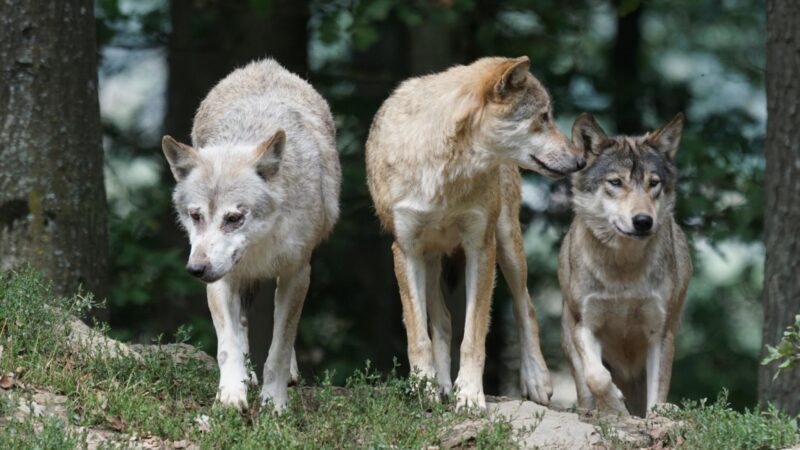
Wolves cannot be herbivores. In the strict sense of the word, herbivores are animals that primarily rely on plant foodstuff to survive. They have digestive systems that help break down plant components, which allows their bodies to absorb all the nutrients that the plant has to offer.
Given this definition, wolves cannot be herbivores. Wolves require a lot of protein to derive energy to maintain their daily activities. While some plants do contain protein, it is often quite minimal. This is not enough to provide them with their daily nutritional needs.
Also, wolves do not have special stomachs that can help them digest and process plant material. As such, they cannot maximize all the nutrients that they can potentially derive from plants.
Can Wolves Be Omnivores?
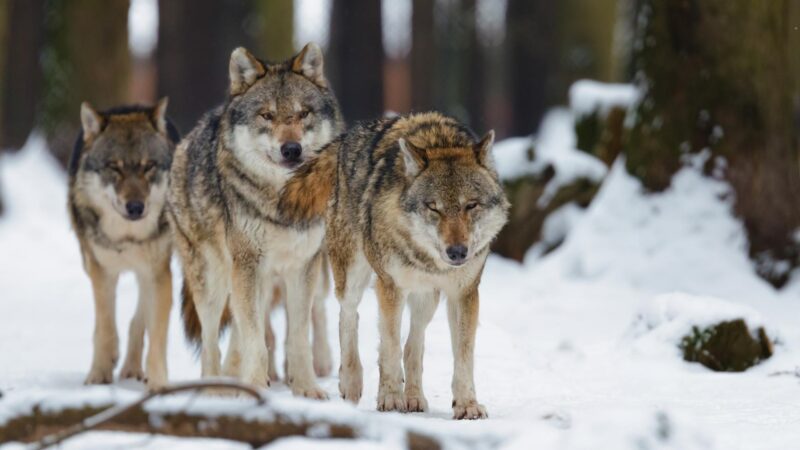
Wolves cannot be omnivores. As previously discussed, wolves are big meat-eaters, but they do not hesitate to eat plants when they have no other choice. Because of this, there are arguments about wolves being omnivores. Nevertheless, experts believe that wolves should still be classified as carnivores.
Interestingly, researchers discovered grasshopper remains in some wolf excretions. This goes to show that even when no vertebrate prey is around, they still prefer eating insects like grasshoppers before consuming plants.
And, as the study reveals, the amount of plant material that wolves consume is only around 1% of their diet. This is quite an insignificant amount, and not enough to have them considered omnivores. Usually, wolves only eat fruits and vegetables when their bodies need nutrients that were not available in their previous meal. Otherwise, they wouldn’t even bother eating plants.
Do Wolves Eat Grass?
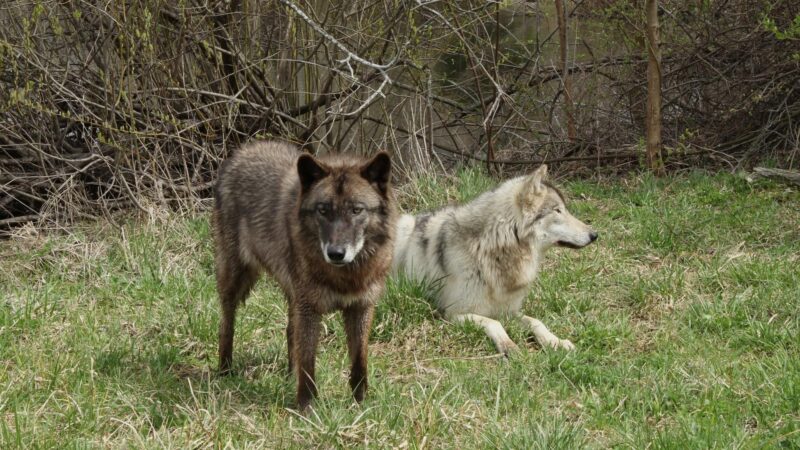
Wolves do eat grass. Wolves have an interesting way of clearing their stomachs when they eat something that they shouldn’t have. That’s exactly the reason why they eat grass.
Unlike ruminants and graminivores, wolves do not have special stomachs that contain microbes that help digest grass. As such, their stomachs find grass hard to digest, and it often causes irritation, which results in vomiting.
Interestingly, this is how wolves get rid of food that they mistakenly ate. That goes to show how smart these carnivores are.
What Do Wolves Love Eating?
Wolves love eating hoofed mammals, otherwise known as ungulates. Among these hoofed mammals, their top favorites include the red deer, the roe deer, and the wild boar.
In a study involving wolf scats, it is revealed that around 80% of these excretions had traces of ungulates. The remaining 20% is divided among domestic animals like dogs, livestock like goats and sheep, small mammals like rodents, and minimal plant matter. This goes to show that wolves do have a preference for eating ungulates.
What’s interesting is that the same is true regardless of the seasons. Wolves prefer eating ungulates, whether it’s summertime or wintertime. Usually, the only difference is whether they’re having deer or wild boar – and it largely depends on the terrain they’re hunting at.
Are Dogs True Carnivores?

Dogs are considered omnivores. Despite the historical connection between dogs and wolves, dogs cannot be considered true carnivores.
Through the years, dogs have developed a palate – and stomach – for both meat and plant material. As such, they can process either of these food sources and absorb nutrients from them.
Do Wolves and Dogs Eat the Same Thing?
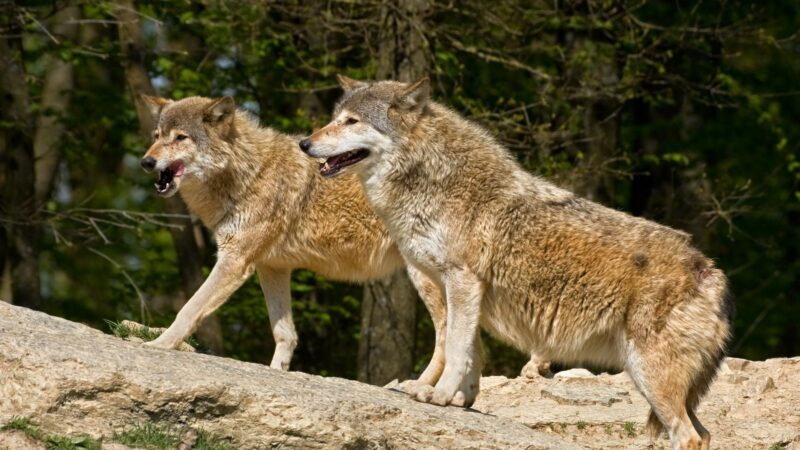
While dogs are descendants of wolves, they no longer eat the same thing. As earlier established, dogs are omnivores, while wolves are true carnivores.
Wolves eat after hunting and killing their prey, and that means their diet consists of raw meat. On the other hand, dogs have been domesticated by humans for thousands of years. This resulted in their evolved stomachs that allowed them to process food that humans also ate. Thus, despite their ability to process raw meat, dogs of today rarely eat them.
Also, their diet differences may have something to do with how often they eat. Wolves require high amounts of protein, not just because they need the energy to hunt, but because they may not have anything to eat for days. This is not the case for dogs. Dogs relied on humans for food for years, and that’s why they can no longer go on days of famine – unlike their wolf ancestors.
Nevertheless, wolves and dogs still share something: they both eat grass if they have to get rid of something they ate. Like their ancestors, dogs’ stomachs cannot process grass, so ingesting some leads to vomiting.
What Kind of Carnivore Is a Wolf?
A wolf is referred to as an opportunistic carnivore. But unlike most opportunistic carnivores that prey on what’s available, wolves take advantage of a prey’s weaknesses before making a move to hunt. Thus, they’re being opportunistic lies in how they hunt – and not just because there’s available prey.
Do Wolves Only Eat Meat?
Ideally, wolves prefer only eating meat. However, that is not always the case. While wolves can go for a few days without eating when there’s no prey available, they still require nutrition. In these instances, wolves will eat minimal amounts of fruits and vegetables for the sake of obtaining vitamins – but not as a replacement for their regular diet.
Would a Wolf Eat a Dog?
A wolf would eat a dog. There have been reported instances of wolves attacking and killing dogs. Specifically, the gray wolf is known to prey on domesticated dogs.
Do Wolves Eat Fruits and Vegetables?
Wolves also eat fruits and vegetables. However, these are not part of a wolf’s regular diet, so it only resorts to eating them if there’s not enough food to hunt.
All things considered, there’s no denying that wolves are carnivores. Their bodies require protein to give them the energy to hunt – and ultimately thrive in the wild. While wolves may forage and eat fruits or grass from time to time, these are merely supplementary. Eating plants will not provide them with the nutrition they need. That’s why they can neither be herbivores nor omnivores.
List of Sources
Bosch, G., Hagen-Plantinga, E. A., Hendriks, W. H. (2015). Dietary nutrient profiles of wild wolves: insights for optimal dog nutrition? The British journal of nutrition.
The role of wolves in ecosystems. Washington Department of Fish and Wildlife.
Barton, B. T., et al. (2019). Grasshopper consumption by grey wolves and implications for ecosystems. Ecological Society of America.
Marshall-Pescini, S., Besserdich, I., Kratz, C., Range, F. (2016). Exploring Differences in Dogs’ and Wolves’ Preference for Risk in a Foraging Task. Frontiers in psychology.
Sin, T., Gazzola, A., Chiriac, S., Rîșnoveanu, G. (2019). Wolf diet and prey selection in the South-Eastern Carpathian Mountains, Romania. PloS one.
